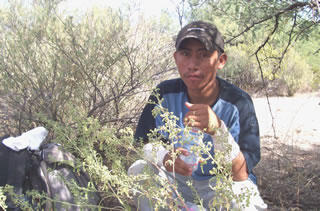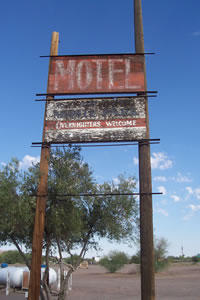September 5, 2005
We drove today to the convention center in Pine Bluff, Arkansas, home to hundreds of people displaced by Hurricane Katrina. It's a day I won't forgot.
The center itself is amazing. Thousands of people show up every day, wanting to help. In fact, the volunteer registration table is swamped, telling folks they can't be used until Thursday or Friday.
The Red Cross, Salvation Army, city and state officials, and countless churches and civic organizations have set up an efficient, compassionate, humane place to receive people. Hundreds of cots, showers, laundry facilities, meal service, clothing, personal hygiene items, and an amazing assortment of things I would never have thought of are available.
People coming in can bathe, eat, sleep, apply for food stamps and other services, register their kids for school, get their hair cut, choose clothing, use computers to look for relatives, make phone calls to call loved ones, the list goes on and on. The one thing they can't do is go home.
Pine Bluff received the last buses out of the Superdome in New Orleans this morning. People piled off the buses, dirty, dazed, clutching bags and children and pets. The stories are unbelievable, almost unfathomable.
A mother of three told us about spending two days in her attic with her kids, her sisters, and their kids, plus several neighbors. They had no car to leave, no bus fare to get to the shelters. On Tuesday, they tore a hole in the ceiling and climbed onto the roof -- where they stayed for three days, waiting for someone to come. "We kept hearing the helicopters," she said. "But they never came for us."
Finally, they were rescued, not by government workers but by men in fishing boats, who dropped them off on dry ground. Then they walked for hours, guided by neighbors and other New Orleans residents, toward the convention center. At one point, they turned a corner and were faced with soldiers, guns drawn, shouting for them to get down.
"We were just trying to get out," she said. "And they treated us like criminals."
Now she sits outside the Pine Bluff community center, five dollars in her pocket, wondering where she will go next. One thing she knows: She won't return to New Orleans.
An older woman sits nearby in a wheelchair, a small dog in her lap. She appears nearly catatonic, until my friend Tina asks if she can pet the dog. She smiles slightly, tells Tina the dog's name. She says she was at the Superdome, but she can't talk about that. The only thing she can focus on now is her dog. She has nothing else.
I'm walking through the center, clutching my notebook, trying to process what I've heard, when an older man grabs my arm. His English is broken. He is from the Philippines, but he lives now in New Orleans ... or he did.
"I need bag," he says, holding my arm tight. I look to where he is pointing. A trashbag holding everything he has left in the world lies split open on the ground. "I need bag."
"Okay," I say. I know where the bags are. This I can do.
I lead him to the area where people have been dropping off suitcases, duffel bags, grocery bags. I know where it is because Barb Jones, the Great River executive regional minister who brought me here, dropped off several suitcases and duffel bags earlier.
A woman gives the man a duffel bag. It is one of Barb's. He breaks into tears, hugs me, hugs the woman, and walks away with his bag.
I feel completely inadequate.
Bruce Bixler, the pastor of First Christian Church in Pine Bluff, has been listening to stories, too. The stories he's heard are much worse. I'm grateful he heard them instead of me. I'm grateful the church is here, has been here, to help.
And I'm grateful for the opportunity to be here now, to witness and to hear.
------------------------------------
DisciplesWorld is a journal of news, mission and opinion of the Christian Church (Disciples of Christ). Sherri Emmons is managing editor of the magazine. Visit the DisciplesWorld web site for more news coverage of the Disciples' response to Hurricane Katrina.










